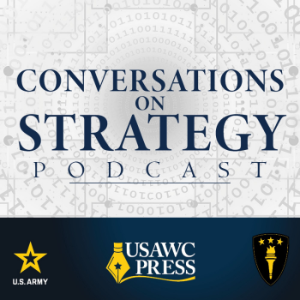
Conversations on Strategy Podcast
News & Politics Podcasts
Conversations on Strategy features quick analyses of timely strategic issues. Topics are geared toward senior military officials, government leaders, academicians, strategists, historians, and thought leaders interested in foreign policy, strategy, history, counterinsurgency, and more. The series first aired in March 2022 and includes more than 25 episodes that range in length from 15–30 minutes long. Guests include Press authors and subject matter experts from the US Army War College and other PME and academic institutions who discuss hot topics like the Russia-Ukraine War, China, Taiwan, artificial intelligence, manned-unmanned teaming, infrastructure, terrorism, urban warfare, the Middle East, and more. The entire series can be found at: https://www.dvidshub.net/podcast/581/conversations-on-strategy-podcast
Location:
United States
Genres:
News & Politics Podcasts
Description:
Conversations on Strategy features quick analyses of timely strategic issues. Topics are geared toward senior military officials, government leaders, academicians, strategists, historians, and thought leaders interested in foreign policy, strategy, history, counterinsurgency, and more. The series first aired in March 2022 and includes more than 25 episodes that range in length from 15–30 minutes long. Guests include Press authors and subject matter experts from the US Army War College and other PME and academic institutions who discuss hot topics like the Russia-Ukraine War, China, Taiwan, artificial intelligence, manned-unmanned teaming, infrastructure, terrorism, urban warfare, the Middle East, and more. The entire series can be found at: https://www.dvidshub.net/podcast/581/conversations-on-strategy-podcast
Language:
English
Contact:
404-282-1450
Website:
https://www.dvidshub.net/
Email:
itunes@dvidshub.net